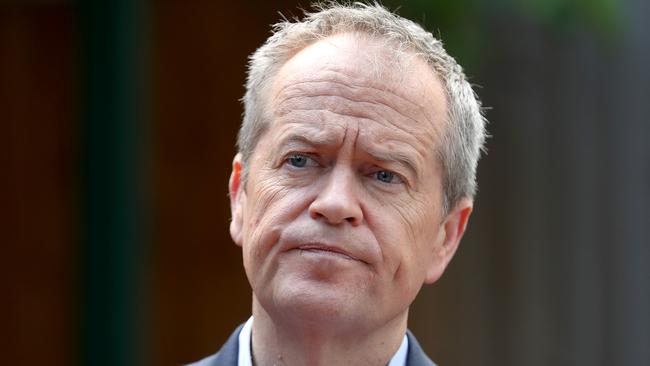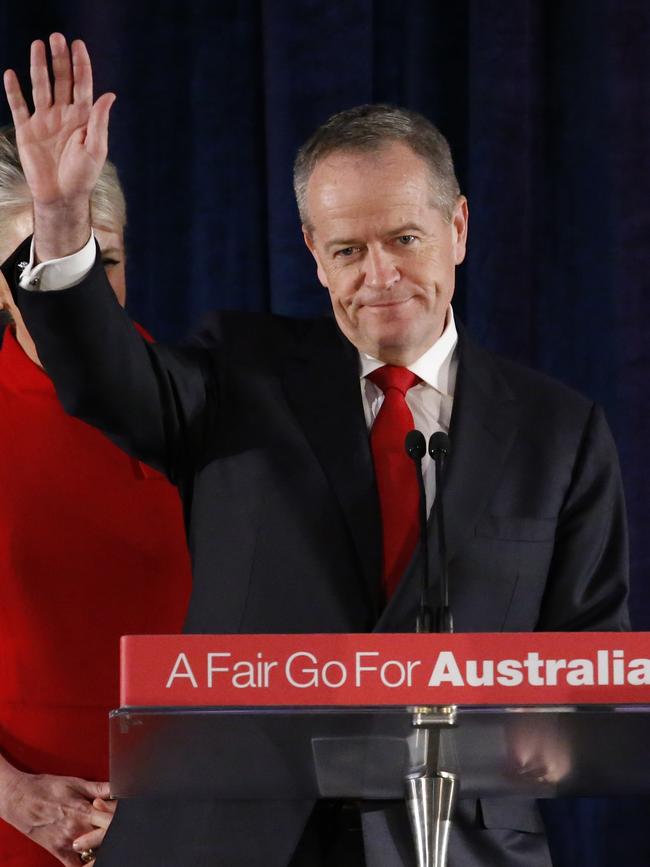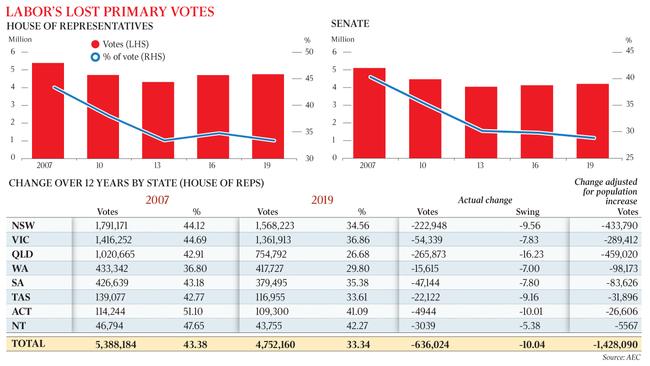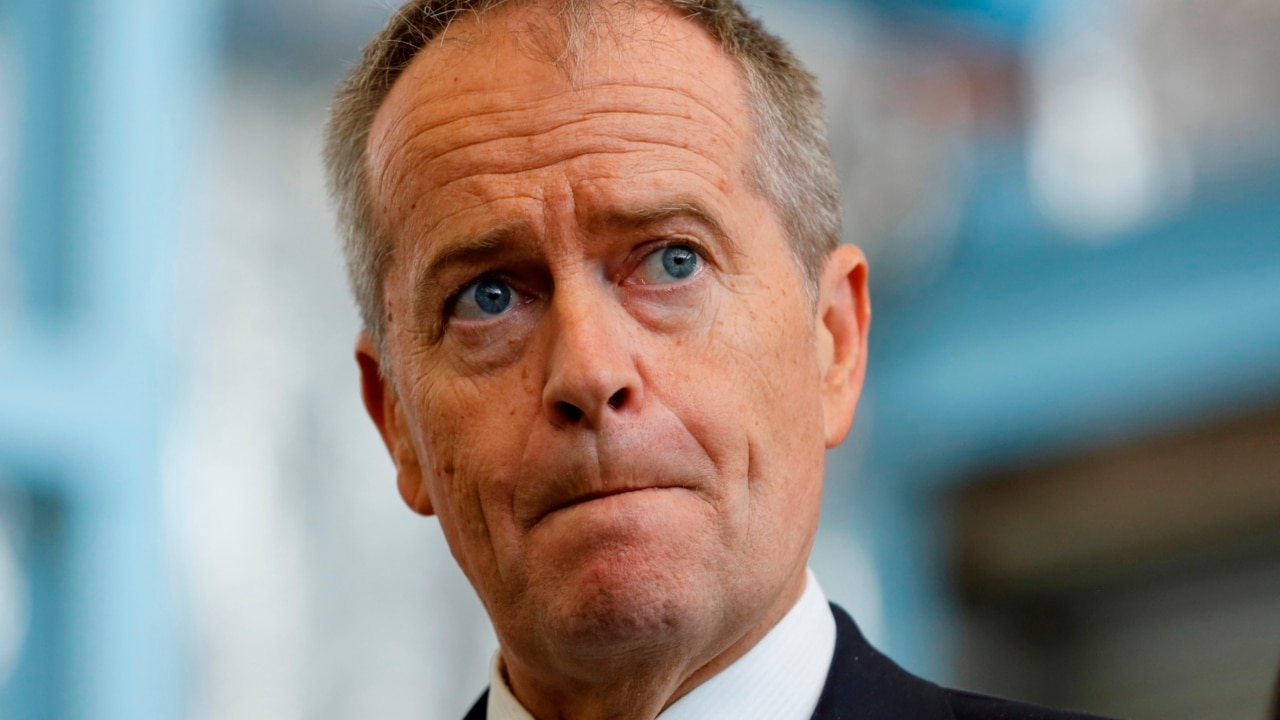Labor election review: Shorten unpopular, no clear message, ‘ambiguous’ Adani failures
Labor’s campaign review has concluded Bill Shorten failed to formulate a unifying narrative, scathing of the leader’s approach to mining.

Labor’s campaign review has declared “Bill Shorten’s unpopularity contributed to the election loss” and he failed to formulate a narrative that unified the party’s policies.
The review findings, which were obtained by The Australian before being publicly released, say Labor “did not settle on a persuasive strategy for winning the election”, highly critical of the former leader’s approach to mining giant Adani and the sector in general.
The findings say the negative gearing and franking credits policies exposed Labor to attacks from the Coalition and the party had “no clear voter-choice message”.
READ MORE: ‘Shorten’s blame wasn’t diluted’ | Shorten lays blame for shock loss | 26 ways to fix broken Labor | Chisholm: Labor must win back country hearts | Shorten allies: don’t scapegoat ex-leader | Labor loss more than franking credits: Bowen | ‘Climate failures cost us’
The report, led by Jay Weatherill and Craig Emerson, has 60 findings, and savage the campaign culture which did not allow strategies to be challenged.
“(This) led to a dismissal of warnings from within the party about the campaign’s direction,” the review findings say.
The findings also say that Labor targeted too many seats which spread its resources and “diluted” the impact of its campaign.

It also declared the policy formulation process “lacked coherence and was driven by multiple demands rather than a compelling story of why Labor should be elected to government”.
It also said the higher expectations of victory led to incorrect assumptions Labor had a better campaign machine than the Coalition.
On “big campaign moments”, the review found “despite some early slips”, Mr Shorten performed “solidly during the campaign, including bettering his rival in three debates”.
The review authors said Labor’s constant flow of announcements became “counter-productive”.
“The almost-daily announcements of new spending policies left little room for campaigning the Coalition,” the review said.
“Labor’s constant flow of new spending announcements during the campaign became counter-productive as they competed against each other and added to perceptions of a risky program.”
Highlighting the trend of votes shifting against Labor, the review found Queensland “swung strongly against Labor”. While swinging “strongly to Labor” in Victoria, the shift did not reflect Mr Shorten’s hopes to pick up more seats in his home state.
The review outlines how its traditional base turned against the party on May 18.
“Labor won only 20 per cent of seats in Queensland in the 2019 election and it has proven very difficult for Labor to win a federal election without performing better in Queensland.
“Outer-metropolitan, provincial and rural Australia swung against Labor while inner-metropolitan areas swung to Labor.
“Economically insecure, low income voters in outer-urban and regional Australia swung against Labor.”

Christians and Chinese-Australians also swung against Labor. Tertiary-educated and higher-income Australians “swung strongly to Labor”.
“The growing gap between Labor’s primary vote share in the House and the Senate is causing fewer Labor senators to be elected, which makes it easier for the Coalition to pass regressive legislation. The gap is greatest in relatively safe Labor-held electorates.”
Attempting to explain the swings, the review authors blamed it on the “complexity and frequency of Labor’s policy announcements”, which crowded out policies and made it “difficult for local campaigns”.
“The almost-daily campaign announcements of new, multibillion-dollar policy initiatives raised anxieties among economically insecure, low-income voters that Labor’s expensive policy agenda would crash the economy and risk their jobs.
“Labor did not craft and convey a persuasive jobs and economic growth story that augmented its mission to reduce inequality.
“Labor’s climate change policy won the party votes among young and affluent older voters in urban areas.”
Labor’s Adani approach: ‘ambiguous, anti-coal rhetoric’
In a stinging attack on Mr Shorten’s approach to Adani and mining, the review slams Labor’s “ambiguous language” combined with “some anti-coal rhetoric”.
It says the Coalition’s campaign associating Labor with the Greens in voters’ minds also had a negative impact on Labor’s disastrous results in regional electorates and “devastated its support in the coal mining communities of regional Queensland and the Hunter Valley”.
The review also suggests that voters most likely to be affected by Labor’s franking credits policy actually swung to Labor.
“Economically insecure, low-income voters who were not directly affected by Labor’s tax policies swung strongly against Labor in response to fears about the effect of Labor’s expensive agenda on the economy, fuelled by the Coalition and its allies.”
The review blames Clive Palmer’s targeted, big-money ad spend for fuelling “significant negative effect on Bill Shorten’s popularity and on Labor’s primary vote”.


“The preferences from Pauline Hanson’s One Nation Party assisted the Coalition in winning the Queensland marginal seat of Longman and the Tasmanian marginal seat of Braddon.”
Detailing the impact of Labor’s “research program”, which helped devise the ALP’s May 18 election strategy, the review authors said they had “performed well in by-elections and introduced innovative techniques into political campaigns”.
“The constant pressure to be ready for a potential early election caused the research program to focus overly on estimating electorate-level outcomes and testing advertising.
“Labor did not use its research program to develop a set of strategic principles to guide the 2019 campaign. Some major strategy decisions were made without reference to research, which left research to focus on the tactical implementation of decisions already taken.”
Partly blaming polling for its defeat, the review authors said Labor “struggled to process internal research that ran counter to its expected win”.
It says campaign tracking was “persistently less optimistic than the published polling” and blamed “inaccuracies” in the overall research program, which led to Labor believing it was “slightly ahead when it was, in fact, behind”.

“Notwithstanding these inaccuracies, there were clear warning signs about Labor’s problems, with the research correctly identifying critical campaign weaknesses that were successfully exploited by the Coalition.”
Assessing Labor’s ground game, advertising and digital campaigns during the election campaign, the review was scathing.
It said Labor’s advertising program was not informed by a “clear strategy”, and also failed to respond to the “magnitude of Clive Palmer’s expenditure”, which crowded out its messaging across broadcast, print and digital platforms.
“Labor’s digital campaign in 2016 was superior to the Coalition’s but by 2019 it was inferior to the Coalition’s and that of its allies.
“Despite a substantial increase in the digital advertising budget, Labor’s digital capacity went backwards.”
The review said “Labor faces an urgent need to dramatically improve its digital campaigning capability” and be more “agile and effective in countering disinformation on digital platforms of its political rivals”.

It also says co-ordination between national, state and local campaigns “should be improved” and that “women were under-represented in the campaign teams”.
“Candidate vetting principles were not consistently applied. There were examples across the nation of excellent engagement by ALP campaigns with culturally and linguistically diverse communities but they were not uniformly applied.”
Review recommendations
The review has also handed down 26 recommendations, including that campaign policies can be bold “but should form part of a coherent Labor story”.
It also says Labor should “position itself as a party of economic growth and reform”, focusing on job creation and rising living standards.
“Labor should adopt the language of inclusion, abandoning divisive rhetoric, including references to the ‘big end of town’,” the review recommends.
It also calls for Labor to broaden its standing with working class people and faith groups.
“Labor should develop a coherent strategy for engaging more fully with culturally and linguistically diverse communities, including Chinese Australians.”
It calls on for Labor to pursue legislation capping individual political donations and legislation for truth in advertising.
“Labor’s next national campaign should be driven by a digital first model that is fit for the digital age,” the review says.
“Labor must develop a comprehensive strategy for message defence and combating disinformation, which should include full-time resources dedicated to monitoring and addressing false messages.”
It also calls for more campaign input from women and indigenous Australians.
‘No lack of dedication or hard work’
The review, which interviewed 120 people including Mr Shorten, concludes that the 2019 election loss was not the result of a “lack of dedication or hard work”.
Mr Weatherill and Mr Emerson said: many of the people “for whom Labor’s policy agenda was designed to benefit voted against the party and those adversely affected by Labor’s tax policies swung to Labor”.
They said “the openness intended by promoting a detailed policy agenda” had caused “fear rather than trust”.
Warning the 2022 election remained a challenge for Labor, the review says Labor must overhaul its culture and policy formulation process to remain competitive.




To join the conversation, please log in. Don't have an account? Register
Join the conversation, you are commenting as Logout